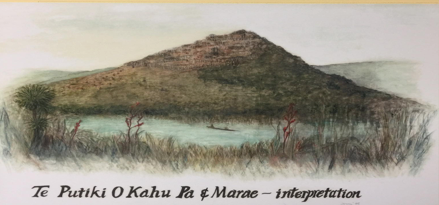
Urgent Remedial Works on Rangihoua (Mothplant Control)
Seizing Key Terrain: Free The Tree's Local Victory on Rangihoua Maunga
The Challenge: A Sacred Maunga, A Strategic "Enemy Stronghold" Demanding a Local Solution
In March 2021, Auckland Council confronted a formidable ecological threat on Waiheke Island's Rangihoua Maunga – a site of immense cultural, archaeological, and ecological value under siege. As Waiheke's second-highest point, Rangihoua Maunga was a strategic "enemy stronghold" for wind-dispersed Mothplant (Araujia sericifera). Each mature plant, laden with hundreds of seeds per pod, made this "key terrain" critical; its capture and defence were paramount for any viable island-wide Mothplant strategy and for protecting adjacent agricultural lands, including Waiheke’s vital vineyards and olive groves, from constant seed rain.
A dense five-hectare infestation demanded urgent action, with only three months before pod maturation. The task demanded not just ecological skill but profound cultural sensitivity, robust community engagement on herbicide use, and an efficient, low-impact operational model. This complex matrix of needs clearly pointed to a dedicated, Waiheke-based specialist.
Our Approach: Local Force, Strategic Impact – Tailored for "Key Terrain"
Free The Tree’s strategy aimed to conquer this "key terrain" by leveraging our distinct local advantages and innovative methods, with cultural reverence foremost:
Cultural Reverence as Our Guide: Our deep partnership with Piritahi Marae leadership—including pre-work consultations, team briefings on sacred areas, and daily karakia—formed our ethical bedrock.
Local Team Advantage – Efficiency, Energy, Reduced Emissions: Being Waiheke-based was a core operational strength. Our team’s minimal travel to Rangihoua Maunga drastically cut transport-related carbon emissions from the outset. Our crew thus arrived on-site fresh, with full energy, ready for a complete, productive workday in this demanding environment – unlike off-island contractors facing ferry travel and transit delays.
Securing "Key Terrain" with Precision and Innovation: Our prior knowledge of Rangihoua and innovative "jungle box" grid system enabled a rapid, precise assault on the Mothplant infestation. We prioritized this critical project, ensuring 100% coverage, minimizing follow-up, and optimizing herbicide use to defend this strategic ground.
Expert Team, Expertly Deployed: Our continuously upskilled local team possessed advanced ecological and technical expertise plus crucial interpersonal skills (persuasion, conflict resolution, community teaching) to navigate this sensitive, visible public project with finesse.
Transparency as a Tool for Trust: Our robust data management systems were pivotal for meticulous planning, operational tracking, and critically, transparent herbicide reporting. This accountability was key to building trust with the Waiheke Local Board and the wider community.
Proactive Alliance with Stakeholders: We maintained open communication with Piritahi Marae, the Local Board, and key neighbouring landowners, including vineyard and olive grove managers, informing them of our progress and methods.
Adaptive Professionalism: Guided by a comprehensive Site-Specific Safety Plan (SSSP) and Hazard Risk register, our approach remained flexible, such as adapting the scope (removing grass planting) with Council's agreement for superior long-term ecological benefits.
Key Outcomes & Impact: "Key Terrain" Secured, Community Dividends Delivered
Our local presence and strategic execution delivered decisive results, clear evidence of the benefits Council and the community gain from empowering dedicated island-based contractors:
Ecological Victory – "Enemy Stronghold" Neutralized: The five-hectare infestation was eradicated. Approximately 4,000 kgs of Mothplant pods were removed before releasing their seeds, critically disrupting the dispersal cycle from this "key terrain" and protecting the wider Waiheke landscape.
Tangible Dividends for Council and Local Industries: This decisive action delivers an estimated 75% reduction in ongoing Council labour costs for the site. Furthermore, containing Mothplant on Rangihoua provided immediate relief and protection to neighbouring agricultural enterprises, including Waiheke's vital vineyard and olive industries, by significantly reducing seed pressure.
Unprecedented Community Trust & Policy Advancement:
Council has received zero verified Mothplant complaints since our work.
Critically, no complaints arose from the strongly anti-herbicide community regarding our methods on this sacred site.
A successful site visit and demonstration for the Waiheke Local Board led to their unanimous vote to loosen the island’s strict chemical dispensation for future invasive control here – a landmark decision praised by Council staff.
Cultural Integrity Preserved: All operations demonstrated respect for the Maunga’s cultural values.
A Model for Low-Carbon, High-Efficiency Local Contracting: This project powerfully illustrates the profound carbon footprint reduction from using an embedded local team, eliminating ferry emissions and minimizing on-island vehicle use. Our fresh, focused team’s ability to deliver full, high-impact workdays maximized operational efficiency and value for Auckland Council, reinforcing a clear path to their sustainability goals.
Enduring Stewardship: Our success cemented our role in Rangihoua's ongoing protection, with the site now managed under our FY24 Temporary Rua Ecological Maintenance contract.







